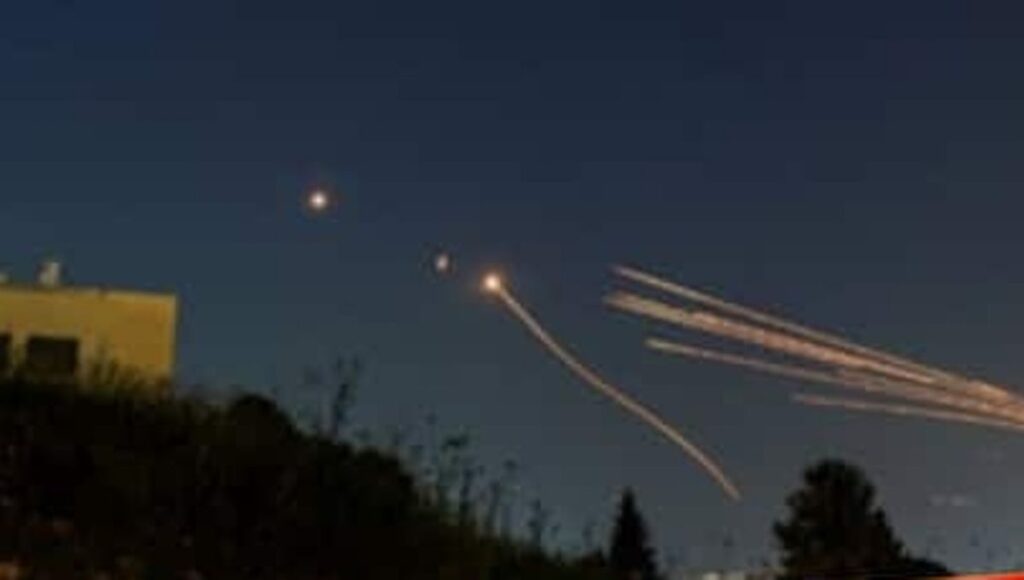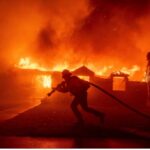As tensions escalate between Iran and Israel, the specter of conflict looms large, drawing global attention and raising significant concerns. Of particular worry are the potential strikes on nuclear sites, prompting the United Nations to issue stern warnings and calls for restraint.

World leaders have appealed for a de-escalation of tensions in the Middle East due to Israel’s pledge of retaliation for Iran’s unprecedented strike on the nation.
10 Points In Iran and Israel War, UN Worried About Strikes
Late last night, Israeli Prime Minister Benjamin Netanyahu convened with his military cabinet to deliberate on potential responses to Iran’s invasion of the nation.
Here are the top 10 updates on this big Strikes
- Israel is facing pressure from allies to show restraint and avoid an escalation of regional conflict as it considered how to respond to Iran’s barrage.
- The head of the United Nations nuclear watchdog said they were concerned about Israel possibly targeting Iranian nuclear facilities. “We are always concerned about this possibility,” said IAEA Director General Rafael Grossi.
- Tensions have surged even higher with Iran’s first direct assault on Israel, in retaliation for a deadly strike on Iran’s consulate in Damascus earlier this month.
- Israeli Prime Minister Benjamin Netanyahu met with his war cabinet late last evening to discuss possible reactions as the country’s military chief of staff said the country would respond to the Iranian attack.
- Following the Iranian attack, the UN Security Council held an emergency meeting Sunday, where Secretary-General Antonio Guterres warned the region was “on the brink” of war and called for a defusing of tensions.
- The US officials, who helped thwart the strike, have urged caution on Israel after Iran’s attack. US President Joe Biden has also told Netanyahu that Washington would not offer military support for any retaliation against Iran, a White House officials told local media.
- India said that the escalating tensions in the region must be resolved through “dialogue & diplomacy”. “We call for immediate de-escalation, exercise of restraint, stepping back from violence and return to the path of diplomacy,” the foreign ministry said in a statement.
- Iran launched more than 300 drones and missiles at Israel late Saturday, nearly all of which, the Israeli army said, were intercepted.
- Tehran said it considered the matter “concluded” unless Israel chose to commit “another mistake”. “However, should the Israeli regime make another mistake, Iran’s response will be considerably more severe,” Iran’s mission to the United Nations said.
- The Iran and Israel tensions have heightened concerns that violence rooted in the Gaza war is spreading further in the region. Since the start of the war in Gaza on October 7, clashes have erupted between Israel and Iran-aligned groups in Lebanon, Syria, Yemen and Iraq.
Also Read: JORDAN DRONE ATTACK: US TROOPS KILLED, 25 HURT AFTER BLAST NEAR SYRIA BORDER
FAQs:
- Why is the UN worried about strikes on nuclear sites in the Iran-Israel conflict?
- The UN is concerned due to the catastrophic consequences of attacks on nuclear facilities, including potential radiation leaks and escalation of conflict.
- What actions has the UN taken regarding the Iran-Israel conflict?
- The UN has issued statements urging restraint and calling for diplomatic solutions to de-escalate tensions between the two nations.
- How might strikes on nuclear sites affect the region and the world?
- Such strikes could lead to a humanitarian crisis, destabilize the Middle East, and have far-reaching implications for global security and peace.
- What diplomatic efforts are being made to address the Iran-Israel conflict?
- Various diplomatic channels, including mediation by other countries and international organizations, are being explored to seek a peaceful resolution to the conflict.
- What role does nuclear proliferation play in exacerbating the Iran-Israel tensions?
- Concerns over Iran’s nuclear program and Israel’s security have heightened tensions, contributing to the volatile nature of the conflict.










